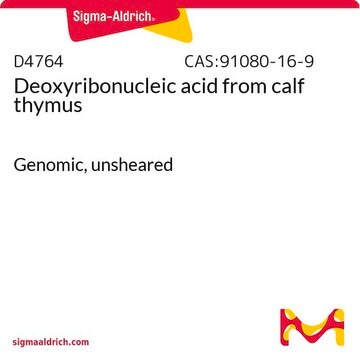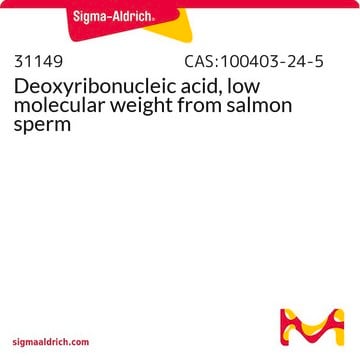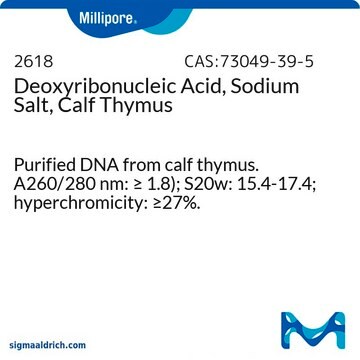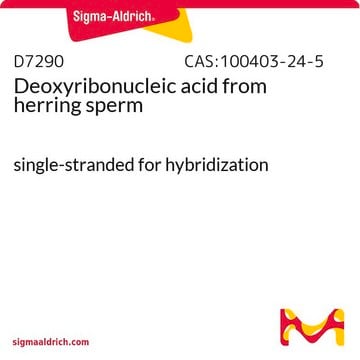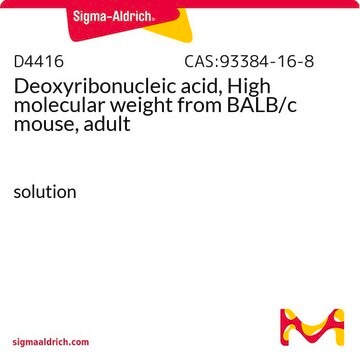D4522
Deoxyribonucleic acid from calf thymus
Type XV, Activated, lyophilized powder
Synonym(s):
Calf Thymus DNA, DNA from calf thymus, Thymonucleic acid
Sign Into View Organizational & Contract Pricing
All Photos(1)
About This Item
CAS Number:
EC Number:
MDL number:
UNSPSC Code:
41106310
eCl@ss:
32160414
NACRES:
NA.52
Recommended Products
Looking for similar products? Visit Product Comparison Guide
General description
High quality double-stranded template DNA isolated from the thymus of male and female calves.
Application
Calf thymus DNA is exceptionally useful as a substrate for DNA polymerase assays, in the amplification of very long fragments and as a carrier DNA for precipitations. It was used as a standard to determine DNA content in gels and for DNA quantification by fluorescent assay.
Calf thymus DNA is exceptionally useful as a substrate for DNA polymerase assays, in the amplification of very long fragments and as a carrier DNA for precipitations.
Features and Benefits
• No nuclease activity detected after 16 h at 37 °C incubation
• High quality template DNA
• High quality template DNA
Quantity
One mg DNA is approx. 20 A260 units.
Preparation Note
Prepared from highly polymerized calf thymus DNA and nicked with DNase using the method of Aposhian and Kornberg.
Reconstitution
Dissolve the DNA gently rocking overnight to a final concentration of 1mg/ml in molecular biology grade water.
related product
Product No.
Description
Pricing
Storage Class Code
11 - Combustible Solids
WGK
WGK 3
Flash Point(F)
Not applicable
Flash Point(C)
Not applicable
Personal Protective Equipment
dust mask type N95 (US), Eyeshields, Gloves
Certificates of Analysis (COA)
Search for Certificates of Analysis (COA) by entering the products Lot/Batch Number. Lot and Batch Numbers can be found on a product’s label following the words ‘Lot’ or ‘Batch’.
Already Own This Product?
Find documentation for the products that you have recently purchased in the Document Library.
Customers Also Viewed
Brian D Holt et al.
Advanced healthcare materials, 5(23), 3056-3066 (2016-12-08)
Synthetic biomaterials are poised to transform medicine; however, current synthetic options have yet to ideally recapitulate the desirable properties of native tissue. Thus, the development of new synthetic biomaterials remains an active challenge. Due to its excellent properties, including electrical
Enzymatic synthesis of deoxyribonucleic acid. IX. The polymerase formed after T2 bacteriophage infection of Escherichia coli: a new enzyme.
H V APOSHIAN et al.
The Journal of biological chemistry, 237, 519-525 (1962-02-01)
Benjamin D Dickson et al.
Molecules (Basel, Switzerland), 24(8) (2019-04-24)
Poly(ADP-ribose)polymerase (PARP) inhibitors (PARPi) have recently been approved for the treatment of breast and ovarian tumors with defects in homologous recombination repair (HRR). Although it has been demonstrated that PARPi also sensitize HRR competent tumors to cytotoxic chemotherapies or radiotherapy
Claudia Gomes et al.
Life science alliance, 4(11) (2021-09-11)
High levels of autoimmune antibodies are observed in COVID-19 patients but their specific contribution to disease severity and clinical manifestations remains poorly understood. We performed a retrospective study of 115 COVID-19 hospitalized patients with different degrees of severity to analyze
Parul Natvar Patel et al.
Tissue engineering, 11(9-10), 1498-1505 (2005-11-02)
The ultimate goal of this research is to develop an injectable cell-scaffold system capable of permitting adipogenesis to abrogate soft tissue deficiencies resulting from trauma, tumor resection, and congenital abnormalities. The present work compares the efficacy of photopolymerizable poly(ethylene glycol)
Our team of scientists has experience in all areas of research including Life Science, Material Science, Chemical Synthesis, Chromatography, Analytical and many others.
Contact Technical Service


